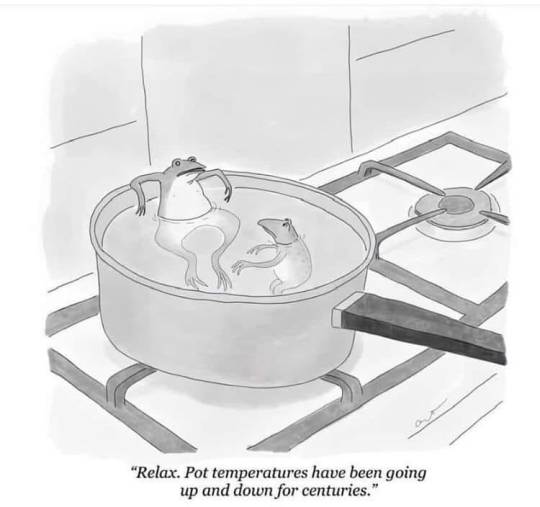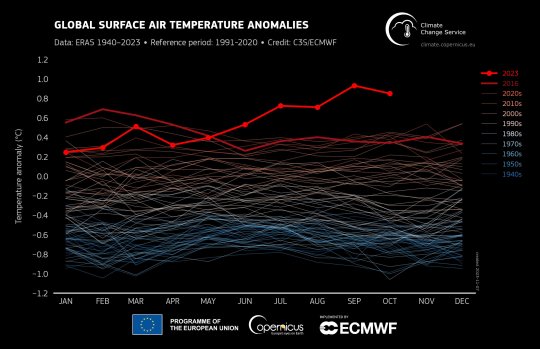#global temperature
Text
"A century of gradual reforestation across the American East and Southeast has kept the region cooler than it otherwise would have become, a new study shows.
The pioneering study of progress shows how the last 25 years of accelerated reforestation around the world might significantly pay off in the second half of the 21st century.
Using a variety of calculative methods and estimations based on satellite and temperature data from weather stations, the authors determined that forests in the eastern United States cool the land surface by 1.8 – 3.6°F annually compared to nearby grasslands and croplands, with the strongest effect seen in summer, when cooling amounts to 3.6 – 9°F.
The younger the forest, the more this cooling effect was detected, with forest trees between 20 and 40 years old offering the coolest temperatures underneath.
“The reforestation has been remarkable and we have shown this has translated into the surrounding air temperature,” Mallory Barnes, an environmental scientist at Indiana University who led the research, told The Guardian.
“Moving forward, we need to think about tree planting not just as a way to absorb carbon dioxide but also the cooling effects in adapting for climate change, to help cities be resilient against these very hot temperatures.”
The cooling of the land surface affected the air near ground level as well, with a stepwise reduction in heat linked to reductions in near-surface air temps.
“Analyses of historical land cover and air temperature trends showed that the cooling benefits of reforestation extend across the landscape,” the authors write. “Locations surrounded by reforestation were up to 1.8°F cooler than neighboring locations that did not undergo land cover change, and areas dominated by regrowing forests were associated with cooling temperature trends in much of the Eastern United States.”
By the 1930s, forest cover loss in the eastern states like the Carolinas and Mississippi had stopped, as the descendants of European settlers moved in greater and greater numbers into cities and marginal agricultural land was abandoned.
The Civilian Conservation Corps undertook large replanting efforts of forests that had been cleared, and this is believed to be what is causing the lower average temperatures observed in the study data.
However, the authors note that other causes, like more sophisticated crop irrigation and increases in airborne pollutants that block incoming sunlight, may have also contributed to the lowering of temperatures over time. They also note that tree planting might not always produce this effect, such as in the boreal zone where increases in trees are linked with increases in humidity that way raise average temperatures."
-via Good News Network, February 20, 2024
#trees#forests#reforestation#tree planting#global warming#climate change#climate crisis#american south#the south#eastern us#southern usa#conservation#meteorology#global temperature#conservation news#climate news#environment#hope#good news#hope posting#climate action#climate science#climate catastrophe#climate hope
13K notes
·
View notes
Text
youtube
Researchers have confirmed that 2023 was the hottest year on record. The European Union's Copernicus climate change service looked at global temperature records going back to 1850. And scientists warn this year could be even hotter.
20 notes
·
View notes
Text
#global temperature#climate crisis#global climate change#greenhouse gas reduction#carbon emissions#science#environmentalism#climate change
17 notes
·
View notes
Text
New Record
On Monday and Tuesday, the Earth experienced the hottest Global Temperature recorded.
How much hotter must it get for something to be done? How many ecosystems must be damaged? How many people have to suffer? How much more?
Are fossil fuels really worth all this damage? Is it so inconvenient to change our ways that we are willing to let the world burn? Is it really worth it?
What will it take for there to be change?
#climate change#climate crisis#awareness#global warming#stop climate change#fyp#change is needed#we need to change#reduce fossil fuels#fossil fuels#Global temperature#Rising temperatures
10 notes
·
View notes
Link
9 notes
·
View notes
Text

Source.
3 notes
·
View notes
Text
Climate
Climate is still controversial? Yes. I’m reminded every time I post a climate story and a denier pops up.
Why do I care about climate? Climate impacts everything. Food chain, jobs, housing, health, animals, plants, etc. I’m saving info so I can find it again. To learn - about trends, land use, natural patterns, and habitats. (I try to be aware of science funded by corporate interests. See Toxic Sludge Is Good For You)
“When Did Climate Science Begin?”
How 19th Century Scientists Predicted Global Warming | Jstor.org
1824 & 1837 Papers by Joseph Fourier, a French mathematician and physicist who spent his career pondering the mechanics and equations governing heat transfer.
1856 Eunice Newton Foote experimented with heat trapping gases (CO2) and wrote a paper for The American Journal of Science. Interesting factoid: “When time came to present her research before the American Association for the Advancement of Science—among the country’s most eminent scientific gatherings—they didn’t allow women to speak, so it was read by a male colleague.”
“Nature changes all the time! Why worry?”
What’s the Difference Between Weather and Climate? | NASA
The difference between weather and climate is a measure of time.
Weather is what conditions of the atmosphere are over a short period of time.
Climate is how the atmosphere "behaves" over relatively long periods of time.
In addition to long-term climate change, there are shorter term climate variations. This so-called climate variability can be represented by periodic or intermittent changes related to El Niño, La Niña, volcanic eruptions, or other changes in the Earth system.
United States Global Change Research Program (USGCRP)
“Thousands of studies conducted by researchers around the world have documented increases in temperature at Earth’s surface, as well as in the atmosphere and oceans. Many other aspects of global climate are changing as well. Human activities, especially emissions of heat-trapping greenhouse gases from fossil fuel combustion, deforestation, and land-use change, are the primary driver of the climate changes observed in the industrial era.”
Climate science is not new. Is not a fad.
The climate scientists are talking - Will we listen?
#climate change#weather#global temperature#earth#science#natural habitat#farm and ranch#gardening#urban planning
3 notes
·
View notes
Link
From USAFacts/New York Times:

2021 was the sixth-warmest year on record.
All states, and especially in the Northeast and upper Midwest, were warmer in 2021 than the 20th century average.
Average US rainfall for the last decade is 3.6% higher than the average rainfall for the previous decade.
In 2021, Mississippi and Massachusetts each had more than 10 inches of precipitation over their 20th century averages.
2 notes
·
View notes
Text
Most people Don’t Understand/Know...多くの人が理解していないこと/知らないこと...
Daily writing promptWhat’s something most people don’t understand?View all responses
〇 Strawberries and Raspberries are Not Berries but Cucumbers, Avocados and Bananas are Berries.
イチゴやラズベリーがベリーの仲間じゃないのに、キュウリ、アボカド、バナナはベリーの仲間であること。
〇 Most (outside Japan) Wasabi are Not Real. Because Real Wasabi is Very Expensive.
ほとんどの(日本以外の)わさびは本物ではないこと。本物のわさびはとても高いから。
〇 The Difference Between Sherbet and…

View On WordPress
#わさび#ナマケモノ#フルー��#dailyprompt#dailyprompt-1890#Fruits#Global Temperature#Most people don’t Know#Most people don’t Understand#Sloths#Time is Money#Wasabi#World#Yes and No#偽物#地球の気温#新しい発見#時は金なり#世界#他の答え
0 notes
Text




october 2023
0 notes
Text

Confirmed: Summer 2023 Hottest in NASA’s Record
All three months of summer 2023 broke records. July 2023 was the hottest month ever recorded, and the hottest July. June 2023 was the hottest June, and August 2023 was the hottest August.
NASA’s temperature record, GISTEMP, starts in 1880, when consistent, modern recordkeeping became possible. Our record uses millions of measurements of surface temperature from weather stations, ships and ocean buoys, and Antarctic research stations. Other agencies and organizations who keep similar global temperature records find the same pattern of long-term warming.
Global temperatures are rising from increased emissions of greenhouse gasses, like carbon dioxide and methane. Over the last 200 years, humans have raised atmospheric CO2 by nearly 50%, primarily through the burning of fossil fuels.
Drivers of climate change, both natural and human-caused, leave distinct fingerprints. Through observations and modeling, NASA researchers confirm that the current warming is the result of human activities, particularly increased greenhouse gas emissions.
6K notes
·
View notes
Text
Chris Hedges: The Dawn of the Apocalypse
Chris Hedges: The Dawn of the Apocalypse
We were warned for decades about the death march we are on because of global warming. And yet, the global ruling class continues to frog-march us towards extinction.
By Chris Hedges/ ScheerPost/ July 26, 2022
The past week has seen record-breaking heat waves across Europe. Wildfires have ripped through Spain, Portugal and France. London’s fire brigade experienced its busiest day since World War…
View On WordPress
#Chris Hedges#Chris Hedges: The Dawn of the Apocalypse#climate change#fire#global temperature#global warming#heat waves#ScheerPost#temperatue
0 notes
Text
#good news#science#environmentalism#nature#snow#ice melt#sea rise#global temperature#global climate change#climate crisis#sea ice melt#water cycle#water
8 notes
·
View notes
Text
Highlighting the critical role that nature plays in both adaption and mitigation simultaneously.
For the first time, world leaders have clearly recognised the interlinked relationship between the global biodiversity and climate crises and the critical role that nature plays in both adaption and mitigation simultaneously. This is an important and welcome move forward.
However, to keep global temperature rise within 1.5°C, we need to move from recognition to establishing concrete pathways for delivery. In this respect, while the COP decisions are an important step forward, the absence of a clear reference to Nature-based Solutions (NbS) is a missed opportunity that will need to be revisited as soon as possible.
Nature-based Solutions provide a widely accepted operational framework for harnessing nature’s role in addressing climate change. A clear reference to Nature-based Solutions in UNFCCC decisions would give confidence to the many state and non-state actors who are already applying them at scale, and provide improved accountability and oversight of NbS by Parties.
0 notes
Text
The global average temperature on Friday was more than two degrees Celsius hotter than pre-industrial levels for the first time on record, Europe's Copernicus climate monitor said Monday, adding Saturday likely continued the unprecedented warming streak.
Months of extraordinary heat are expected to make 2023 the hottest year in history, with droughts, massive wildfires and fierce storms ravaging swathes of the planet.
According to new data, global temperatures on November 17 were 2.07 °C above the pre-industrial average, the EU's Climate Change Service (C3S).
"This was the first day when global temperature was more than 2 °C above 1850-1900 levels," said Samantha Burgess, C3S Deputy Head on X, formerly known as Twitter.
Preliminary data suggests the record continued into Saturday, with temperatures around 2.06 °C above the pre-industrial average, Copernicus said on X.
Continue Reading.
191 notes
·
View notes
Text
Anybody else completely unable to enjoy warm fall weather because it’s just a reminder of the progress of climate change? Because yeah, when I was little, our autumn weather was much cooler.
#climate change#climate crisis#climate emergency#global climate change#warm weather#fall#autumn#climate anxiety#global warming#weather#temperature#environmentalism#environmental activism#save the earth#protect the earth#leftblr#leftist#communist#socialist#communism#socialism#anti capitalist#anti capitalism#leftist politics#human rights
118 notes
·
View notes